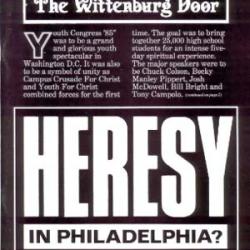Sometimes you encounter a specimen of something that is such a perfect example that it's difficult to do more than just stand back and gawk, marveling at the sheer purity of the thing itself.
We've discussed here the feigned offendedness of the IndigNation — those who seem addicted to and intoxicated by finding or manufacturing reasons to self-righteously puff themselves up with artificial umbrage.
And we've discussed the bizarre contradictions of the persecuted hegemons — those who claim the privilege that in their view pertains to being a dominant ethnic or sectarian majority while simultaneously posturing as a persecuted and put-upon minority.
The two groups overlap quite a bit, sharing as they do a similar refusal to find reality persuasive and a similar perpetual state of aggrievement.
That overlap is neatly illustrated by this fine example of both things provided by a Mr. Dean Strayer of Newark, Del., who proudly submitted this masterpiece of misplaced offendedness for publication in a letter to the editor:
Why do a majority of people in this country who believe this is the Christmas season, be they Christians or non-Christians, have to be relegated to the back of the bus by the secular humanists and atheists who view the word Christmas as bigoted.
Why has Merry Christmas been replaced by the utterly ridiculous and inane happy holidays in almost all ads and greetings by store employees?
I suppose the next thing the secular humanists and ultra-progressives who pollute America with their repulsive political correctness will want to do is replace Santa Claus with the weight-challenged, not quite young, bringer of items to spoil little humans. Well, not me.
So I would like to take this opportunity to wish everyone including the humanists and progressives a very Merry Christmas. And be good, because Santa Claus is coming to town.
Dean Strayer, Newark
It's all right there in all its corrosively delusional glory: the assertion of hegemonic privilege intertwined with the claim of persecution (he's exactly like Rosa Parks!), the puzzling preference for unhappiness, the ability to take extreme offense from the well-wishes of others. It's a remarkable thing.
And it's a sad thing. The sadness of it is qualified somewhat by the harm it does to others, but it remains sad enough that one wishes there was something one could do to help those trapped inside this self-inflicted misery.















